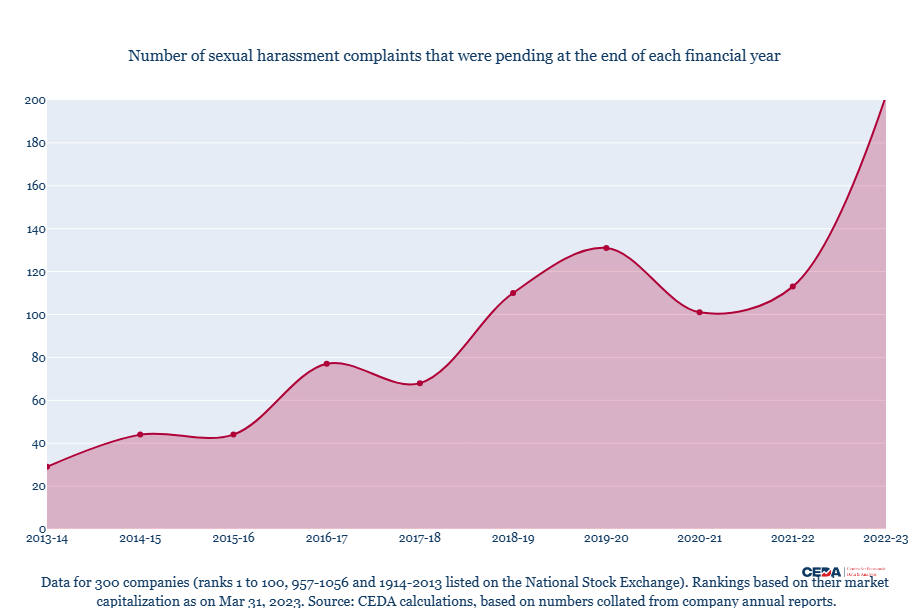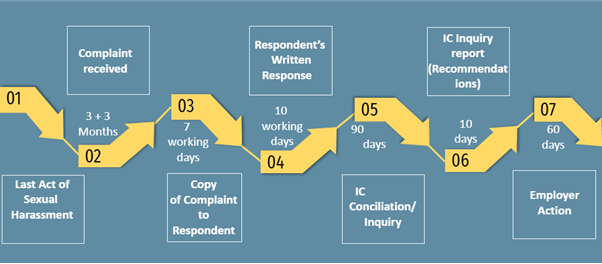This Matters More Than You Think
POSH Responsibilities are Not an Option.
India is becoming the world's fastest-growing startup ecosystem with over 112,718 DPIIT-recognised startups and 114 Unicorns as of March 2024. With this rapid growth comes the responsibility of creating safe and inclusive workplaces. For many in the startup world, work is more than just a job—it's a passion, a dream. Ensuring that everyone feels respected and protected is essential. That's where a strong POSH (Prevention of Sexual Harassment) framework steps in, helping to build a culture where people can focus on their ambitions without fear.
How Well Do YOU Know POSH?
Let’s put your knowledge to the test:
Do you know the specific role of the Internal Complaints Committee (ICC) under the POSH Act?
How often does your organisation conduct mandatory POSH training sessions?
Are you aware of the immediate steps that should be taken if an employee reports harassment?
If you struggled with these questions, it might be time to assess how your organisation handles workplace safety.
So, what exactly is POSH?
The Prevention of Sexual Harassment (POSH) Act, established in 2013, is a critical legal framework designed to protect individuals, particularly women, from sexual harassment in the workplace. This law mandates that all organisations with ten or more employees form an Internal Complaints Committee (ICC) to address and resolve harassment complaints. POSH is not just a legal requirement; it’s a commitment to creating a safe, respectful, and inclusive work environment.
A Brief History and Some Eye-Opening Statistics
The journey towards a formal POSH Act began with the Vishaka Guidelines in 1997, laid down by the Supreme Court in response to a tragic case of workplace harassment. The POSH Act was then enacted to provide a robust legal structure to combat such incidents.
According to data, while the number of POSH cases reported has risen significantly over the past decade, this increase reflects both improved awareness and the ongoing challenges in ensuring workplace safety. Despite these strides, many startups still lack comprehensive POSH policies, with only a minority implementing fully functional frameworks. It’s concerning to note that several smaller organisations either don’t have a POSH committee or are unaware of their obligations under the Act.
While companies are required to resolve sexual harassment complaints within 90 days, the number of unresolved cases has been steadily increasing over the years. Data from 700 NSE-listed companies analysed by The Udaiti Foundation shows a 67% rise in pending sexual harassment complaints, highlighting the challenges organisations face in resolving these issues promptly. As of 2022-23, there were nearly 200 unresolved complaints in a sample of 300 companies, according to CEDA. This trend underscores the critical need for startups to implement strong POSH frameworks to ensure timely and effective complaint resolution, fostering a safer workplace.
The Udaiti Foundation's women in India Inc survey also found that, of over 200 HR leaders, 59% of companies had not set up an Internal Complaints Committee (ICC) for sexual harassment cases, which is mandated by the Prevention of Sexual Harassment (POSH) Act. Often, ICCs are only established after a complaint is filed, and many organisations fail to educate employees about their rights.
Reporting a POSH Case: What You Need to Know
As an Employee: How to Report a POSH Case
Reporting a case of sexual harassment is a critical step in ensuring a safe and respectful workplace. Here’s a simple guide on how to report a POSH case within your organisation:
Identify the Incident: Recognise and understand the behaviour that constitutes sexual harassment under the POSH Act. This could include unwelcome physical contact, sexually coloured remarks, showing pornography, or any other unwelcome sexual advances, either in person or digitally.
Document the Incident: It’s important to document the details of the incident(s) clearly. Write down what happened, when and where it occurred, and any witnesses who were present. This documentation can be crucial when filing a formal complaint.
Submit a Formal Complaint: Reach out to your company’s Internal Complaints Committee (ICC). Submit a written complaint within three months of the incident. The complaint should be signed by you and include all relevant details. If you’re uncomfortable submitting the complaint alone, you can ask a colleague, friend, or family member to assist you.
Confidentiality is Key: Remember, your complaint will be handled with strict confidentiality. The ICC is bound to maintain your privacy and protect you from any form of retaliation.
Understand the Process: After filing your complaint, the ICC will conduct an investigation, which should be completed within 90 days. You may be called for a hearing, and the accused will also be given a chance to present their side.
Expect a Resolution: Based on the findings, the ICC will recommend appropriate actions to the employer, which may include penalties for the harasser or counselling and training for all employees. The employer must act on these recommendations within 60 days.
Remember, ignorance of POSH is not just a knowledge gap—it’s a risk to your employees and your company. At MetaMorph, we recognise that startups have unique challenges when it comes to implementing POSH. Our R&C team specialises in crafting customised POSH frameworks that are not just compliant but also tailored to your company’s culture. From establishing ICCs to conducting awareness sessions, we provide end-to-end support to help you build a workplace where safety, respect, and inclusivity are the norms. Don’t leave your company’s culture to chance—let us help you create a POSH-compliant environment that empowers everyone.
POSH Policy Checklist:
Ensuring an effective POSH (Prevention of Sexual Harassment) policy is key to a safe workplace. Use this checklist to evaluate your current policies, identify gaps, and make necessary improvements.
Internal Complaints Committee (ICC)
Is there a functioning ICC with at least one female member, comprising half the committee?
Is there an external member experienced in handling sexual harassment cases?
POSH Policy Document
Is there a written POSH policy that’s easily accessible to all employees?
Does it cover all forms of harassment, including digital and off-site?
Training and Awareness
Are mandatory POSH training sessions held at least annually?
Is POSH training part of the onboarding process for new hires?
Complaint Reporting Process
Is the reporting process clear and confidential?
Is support available for those needing help to file a complaint?
Investigation and Resolution
Are complaints investigated within 90 days?
Are there defined steps for resolution and follow-up?
Policy Review and Updates
Is the POSH policy regularly reviewed and updated?
Is there a feedback mechanism for employees?
Support and Resources
Are resources and support services readily available?
Does your organisation offer counseling for affected employees?
Management Involvement
Are leaders actively promoting and supporting POSH policies?
Is there visible commitment from senior management?
Documentation and Record Keeping
Are records of complaints and resolutions maintained accurately?
Is policy distribution documented?
Emergency Measures
Are emergency contacts and procedures clearly communicated?
If you need expert guidance to strengthen your POSH framework or need support in any area, MetaMorph is here to help. Our tailored POSH services can assist in creating a respectful and legally compliant work environment, empowering your team and fostering a culture of safety and respect. Reach out at yashna@metamorph.work
Expert Take: POSH-Certified with Yashna Ray
Creating a workplace where everyone feels safe and respected is not just a legal obligation—it’s a moral commitment. To ensure that your organisation is truly fostering a positive work environment, understanding and implementing the Prevention of Sexual Harassment (POSH) Act is crucial. We asked Yashna Ray, a core team member at MetaMorph and a POSH-certified expert, to share her insights on how Indian startups can navigate and apply POSH effectively. Here’s what she had to say:
Q: What are the key elements of the POSH Act that every employee should be aware of?
A: “When it comes to the POSH Act, the key thing to remember is that it’s not just about protecting women; it's about creating a safe space for everyone. While the Act focuses on preventing sexual harassment of women, many workplaces extend these protections to all genders. As an employee, you should know who to turn to with a grievance and how to make a complaint in a safe and, if necessary, anonymous way. The Internal Complaints Committee (ICC) must be headed by a woman and have at least half its members as women, all trained to handle sensitive topics. And remember, POSH covers not just the physical office but any work-related events or communications, even if they're virtual or offsite.”
Q: How should companies structure their Internal Complaints Committee (ICC) to comply with POSH?
A: “To comply with POSH, your ICC needs to be well-structured. Ideally, it should have at least four members, and for larger organisations, you might need more. It’s crucial to have a senior female employee as the presiding officer. Include two employees from within the organisation and an external member who is familiar with issues relating to sexual harassment. Half of the ICC members should be women. This structure ensures diverse perspectives and a balanced approach to handling complaints.”
Q: What should an effective POSH training programme include?
A: “Effective POSH training should be interactive and engaging. It’s not just about ticking off a compliance box. I recommend incorporating activities that involve employees, like discussions and role-playing, to make the training more impactful. It's also important to clearly define what constitutes sexual harassment and explain what actions are considered inappropriate both in the workplace and beyond.”
Q: How can companies assess the effectiveness of their POSH policies and initiatives?
A: “Assessing the effectiveness of POSH policies can be challenging, but there are a few strategies that can help. One approach is to conduct anonymous surveys to gauge employees' feelings of safety and their awareness of resources. Another indicator is whether employees who make complaints stay with the company longer. If employees feel their issues have been resolved satisfactorily, they’re more likely to remain with the organisation.”
Q: How should organisations respond if gaps or issues are identified in their POSH implementation?
A: “If you identify gaps in your POSH implementation, it’s important to address them quickly. Start by simplifying your policy to ensure it’s easy to understand and free of ambiguity. Seek advice from POSH experts or legal professionals to review and approve the policy. Make sure the policy is easily accessible to all employees and enhance training to cover all aspects thoroughly. Handling complaints seriously, promptly, and impartially is crucial for maintaining trust and ensuring a respectful workplace.”
By integrating Yashna’s insights into your POSH framework, you can build a workplace that is not only compliant but also genuinely supportive and inclusive.
If you need assistance in setting up a POSH-compliant framework or improving your current policies, MetaMorph is here to help. Our expert team can guide you through every step of the process, from developing customised POSH strategies to delivering engaging training sessions. Contact us today at yashna@metamorph.work to learn how we can support your organisation in creating a workplace where everyone can thrive.
Don’t leave us yet!
Looking for more ways to build a thriving startup team? Explore our range of HR services tailored to the unique needs of Indian startups, including talent acquisition, DEI hiring, and employer branding. MetaMorph can help you attract, retain, and empower your most valuable asset – your people.
MetaMorph isn't your typical HR firm. We're a 360° HR Advisory firm dedicated to helping startups scale, evolve, and grow. We’ve helped more than 220 startups and multiple hires (and counting), providing them with the platform and opportunities they deserve.
Thank you for being a part of the MetaMorph journey!




